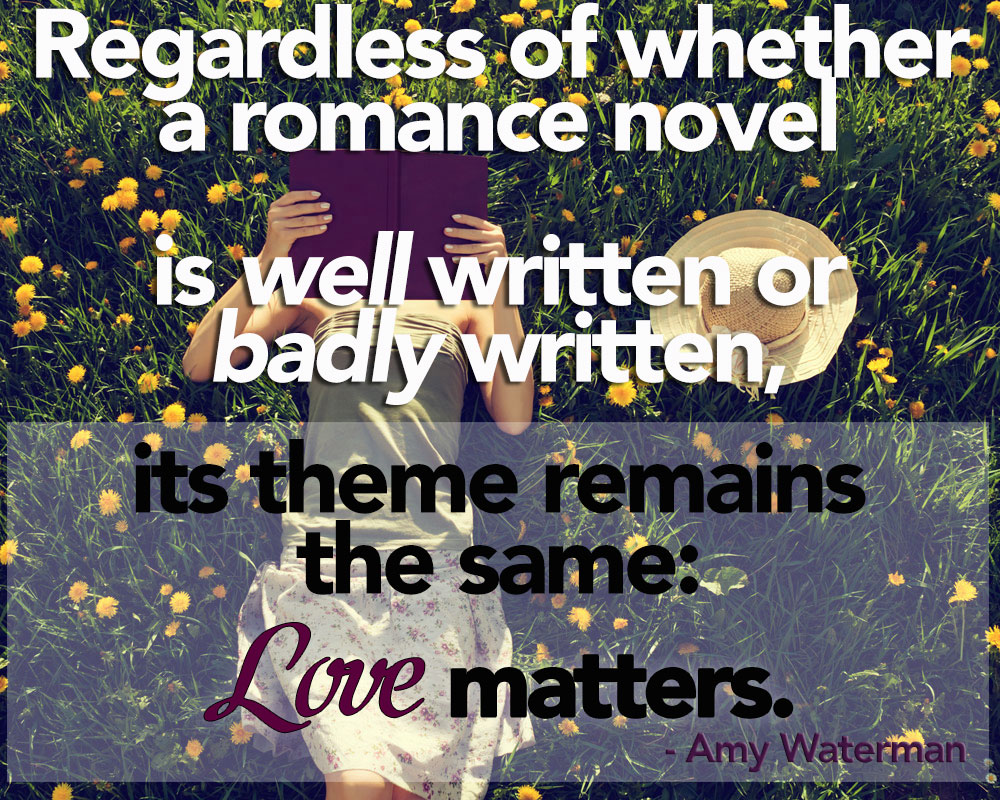
Wife’s Addiction to Romance Novels Ruining Our Marriage.”
Romance Novels Will Make Women Crazy and Ruin Their Marriages.”
Romance Novels Bad for Women’s Health and Psyche, Psychologist Says.”
Yes, those are real headlines. (Probably written by men.)
If you’ve got a stack of romance novels beneath your bed, your palms might be getting sweaty about now.
Those headlines are talking about you. Or women like you.
Did you have any idea that your reading habits were leading you down such a dark path?
I came across those headlines while looking for peer-reviewed studies on romance novels and relationships.
Google, always helpful, suggested some other searches I might be interested in:
“Are romance novels sinful? Are romance novels bad for you? Romance novels are trash. Romance novels are bad for relationships.”
Thanks, Google.
It must feel good to know everyone is so worried about you.
Who knew the choice of book on your bedside table could be of such public concern?
One pundit even professed her belief that romances could become a dangerous addiction for women, no different from porn for men.
What’s thin on the ground are actual studies instead of opinions.
And the studies out there show that romance readers are—hold your breath—happier in general.
(Plus, they enjoy an above-average sex life. But you already guessed that!)
Romance readers have reason to be happy. Statistics tell us that the average romance reader is married, between 30 and 54 years of age, considers herself a feminist, and earns about $55,000 a year. [1] Nothing to complain about there.
So why do psychologists worry so much about the effect of a woman’s light reading entertainment on her relationships?
Relationship psychologist Susan Quilliam believes that romance novels “offer an idealized version of romance, which can make some women feel bad about themselves because their relationships aren’t perfect.” [2]
(She admits that her view is not supported by the data, though: “Studies have shown a correlation between high levels of romance usage and happy monogamous relationship.” [3])
Dr. Gina Barreca is not deterred by the research, either.
She dismisses romances as enabling fictions, or “the narratives we create for our own lives so that we won’t have to confront our anger, or disappointment, or unhappiness.” [4]
So are women reading romances to escape their unhappy relationships and difficult feelings?
That doesn’t match up with what we know of our happily coupled-up romance readers.
It does, however, match what we know of people who binge-watch TV. Watching television for long periods has been linked to depression, loneliness and anxiety, as well as obesity and diabetes. [5]
All fiction involves elements of escapism, fantasy and idealization. So why target romances in particular? Surely watching too many James Bond movies is just as bad for men.
Romance writers like Jenny Crusie and Maya Rodale have an idea.
They think that romance novels are targeted because they’re by women for women.
Romance novels disrupt the status quo by putting the search for love in its rightful place, in the center of the narrative.
As Alyssa Rosenberg explains:
Romance novels are a tonic, a form of reassurance that someone is interested in ordinary women’s inner lives and is rooting for us to resolve our conflicts about work, love, and what we deserve from our relationships.” [6]
Regardless of whether a romance novel is well written or badly written, its theme remains the same:
Love matters.
Loving relationships belong at the center of our lives.
Reading romances doesn’t mean you’re thwarted in love, any more than reading murder mysteries means you’re a thwarted detective.
Rather, it shows what’s in your heart. You care about love. You like to see people falling for one another. It brings you joy to imagine them living happily ever after.
What’s so wrong with that?
Full disclosure: I did my master’s thesis on the romance genre. Since then, I’ve come to respect the genre and those who work within it.
It always seemed odd to me that men could write explicitly about violence with no one batting an eye, while women writing about love were ridiculed.
Why is it easier for us to read about people hurting one another, rather than people loving one another?
I, for one, LIKE to think, write, and read about people loving one another. (I’m in the right business!) There’s no juicier topic than a man and a woman and what comes between them on the often-difficult road to a lifetime together.
Romance novels don’t pretend to instruct. They entertain. Their happy endings leave us with a smile and a warm heart. That’s good for women AND the men they love.
There are worse things you can do than spend a few hours dreaming about love.
[1] http://www.huffingtonpost.com/maya-rodale/who-is-the-the-romance-novel-reader_b_7192588.html
[2] http://www.livescience.com/14985-romance-novels-bad-women-health-psyche-psychologist.html
[3] http://jfprhc.bmj.com/content/37/3/179.full
[4] https://www.psychologytoday.com/blog/snow-white-doesnt-live-here-anymore/201210/romance-can-hurt-rather-help-real-partners
[5] https://www.theguardian.com/commentisfree/2016/mar/04/binge-watching-mental-health-effects-research
[6] https://www.washingtonpost.com/news/act-four/wp/2014/05/20/men-stop-lecturing-women-about-reading-romance-novels/




Let us know what you think!